Merchant of Venice Act 2, Scene 2 Modern English Translation Meaning Annotations – ICSE Class 10 & 9 English
EnglishMathsPhysicsChemistryBiology
ICSE SolutionsSelina ICSE SolutionsML Aggarwal Solutions
Original Text
Act II Scene II
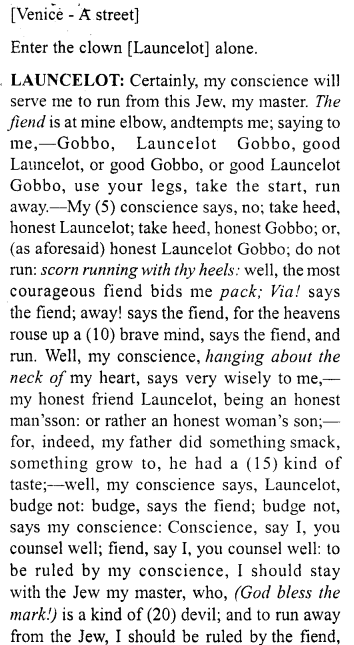
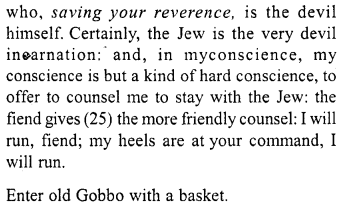
Modern English Reading
Act II Scene II
LAUNCELOT : Certainly, my conscience will allow me to run from this Jew my master. The devil is at my elbow and tempts me, saying to me, “Gobbo, Launcelot Gobbo, good Launcelot” or “good Gobbo” or “good Launcelot Gobbo, use your legs, get going, run away.” My conscience says, “No; be careful, honest Launcelot, be careful, honest Gobbo” or, as I said before, “honest Launcelot Gobbo, don’t run; scorn running with your heels.” Well, the most courageous devil tells me to pack. “Go!” says the devil; “Away!” says the devil. “For heaven’s sake, wake up a brave mind,” says the devil ’and run.” Well, my conscience, hanging, about the neck of my heart, says very wisely to me, “My honest friend Launcelot, being an honest man’s son”—or rather “an honest woman’s son;”—because indeed my father experienced some things, earned some things, he had a kind of taste;—well, my conscience says, “Launcelot, don’t budge.” “Budge,” says the devil. “Don’t budge,” says my conscience.” Conscience, “I say, you advise me well.” “Devil,” I say, “you advise me well.” To be ruled by my conscience, I should stay with the Jew my master, who, God save us all! is a kind of devil; and, to run away from the Jew, I should listen to the devil, who, deliver us from evil! is the devil himself. Certainly, the Jew is the very devil incarnate; and, in my conscience, my conscience is only a kind of hard conscience, to offer to advise me to stay with the Jew. The devil gives the more friendly advice: I’ll run, devil; my heels are at your commandment; I will run.
Enter old Gobbo with a basket.
Word Meaning With Annotation
The fiend : Satan; the devil, scorn running with thy heels : “to take to one’s heels” is a colloquial phrase meaning “to take to flight.” pack : depart. Via : ‘Take the road’, hanging about the neck of : restraining, holding back. (Just as we might imagine a wife hanging about the neck of her husband, restraining him from some act.) God bless the mark ! : this expression was used as an apology for having used any coarse expression: here for having used the name of the devil, which was supposed to be unlucky, saving your reverence : used in the same sense as “God bless the mark !”
Original Text
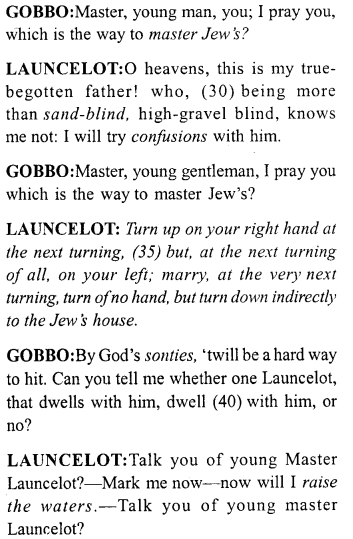
Modern English Reading
GOBBO : Master young man, you, please; which is the way to Master Jew’s?
LAUNCELOT : Oh, heavens! This is my biological father, who, being more than half¬blind, nearly stone blind, doesn’t know me: I’ll try to confuse him.
GOBBO : Master young gentleman, please, which is the way to Master Jew’s?
LAUNCELOT : Tum up on your right hand at the next turning, but, atthe next turning of all, on your left; damn it, at the very next turning, turn of no hand, but turn down indirectly to the Jew’s house.
GOBBO : Be God’s sonties, it will be a hard way to go. Can you tellme whether one Launcelot, who lives with him, lives with him or not?
LAUNCELOT : Are you taking about young Master Launcelot? Listen to me now; now I will really get him. Are you talking about young Master Launcelot?
Word Meaning With Annotation
Master Jew’s : The word “Master” is used here as a title of respect, with much the same effect as “Sahib”, sand-blind : half-blind, “high-gravel” blind represents a further stage of blindness, but it is still not so bad as “stoneblind” i.e. completely blind, confusions : wrongly used by Launcelot, who means “conclusions”, turn up on your right hand at the next turning, but, at the next turning of all, on your left; marry, at the very next turning, turn of no hand, but turn down indirectly to the Jew’s house : this is deliberately given as a confused and senseless direction, sonties : God’s health, so perhaps it was customary to swear by the health of the Deity. Or it may mean “By the saints.” raise the waters : brings tears to the old man’s eyes by telling him that his son was dead.
Original Text
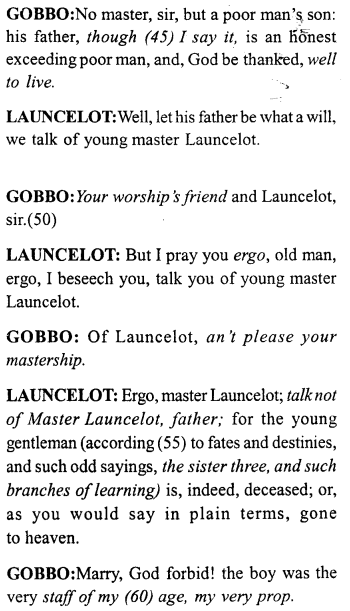
Modern English Reading
GOBBO : No master, sir, only a poor man’s son; his father, although I say it, is an honest, exceedingly poor man, and, thank God, well enough to live.
LAUNCELOT : Well, let his father be what he will be, we’re talking about young Master Launcelot.
GOBBO : Your worship’s friend, and Launcelot, sir.
LAUNCELOT : But please, therefore, old man, therefore, I beg you, are you talking about young Master Launcelot?
GOBBO : Of Launcelot, if it pleases you, sir.
LAUNCELOT : Therefore, Master Launcelot. Don’t talk about Master Launcelot, father; for the young gentleman,—according to Fates and Destinies and such odd sayings, the Sisters Three and such branches of learning,—is indeed dead; or, as you would say in plain terms, gone to heaven.
GOBBO : Damn it, God forbid! The boy was the very support of my age, my very prop.
Word Meaning With Annotation
Though I say it : an apology for boasting of his own honesty and poverty, well to live : may mean “in good health”. But the more common meaning would be “well to do.” a : a contraction for “he”; it is used only in the speech of uneducated countrymen, your worship’s friend : you may call him your frignd, but he is not entitled to be called “Master”. Ergo : Latin word for “therefore”. Launcelot uses it here because it sounds learned, but he seems not to know the use or meaning of the word, an’t please your mastership : if it please you, sir! talk not of Master Launcelot, father : the word “father” was used as a respectful form of address to any old man. the sister three, and such branches of learning : the three sisters, Clotho, Lachesis, and Atropos, were also called the Fates and Destinies; they are the symbolic classic conception of fate and destiny, ranches of learning : may be read as “learned names and phrases.” Shakespeare is satirising those people who are not content to use plain speech, but attempt to use learned words and phrases, staff of my age, my very prop : Launcelot had been a source of support to his father, just as a staff is to a feeble person, or a prop to a wall.
Original Text
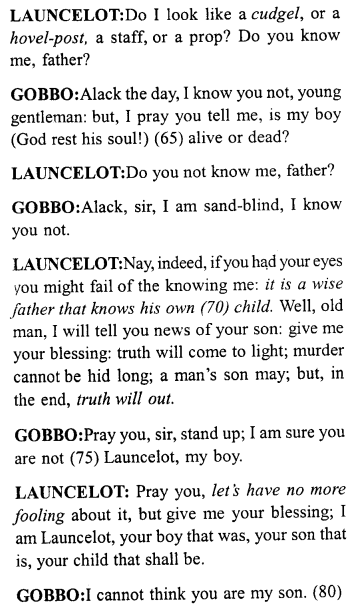

Modern English Reading
LAUNCELOT : Do I look like a club or a beating stick, a staff or a prop? Don’tyou know me, father?
GOBBO : Unhappy the day! I don’t know you, young gentleman; but please tell me, is my boy—God rest his soul!—alive or dead?
LAUNCELOT : Don’t you know me, father?
GOBBO : Sorry, sir, I am half-blind; I don’t know you.
LAUNCELOT : No, indeed, even if you had your eyes, you might not know me: it is a wise father that knows his own child. Well,old man, I’ll tell you news of your son. Give me your blessing; truth will come to light; murder cannot be hidden long; a man’s son may, but, in the end, truth will come out.
GOBBO : Please, sir, stand up; I am sure you are not Launcelot, my boy.
LAUNCELOT : Please, let’s have no more fooling about it, but give me your blessing; I am Launcelot, your boy that was, your sonthat is, your child that shall be.
GOBBO : I cannot think you are my son.
LAUNCELOT : I don’t know what I shall think of that; but I am Launcelot, theJew’s man, and I am sure Margery your wife is my mother.
Word Meaning With Annotation
Cudgel : a club or lathi, this is used palyfully and is suggested by the literal meaning of the word “staff’ m the previous line, hovel-post : a wooden post or upright used in the building of a hovel or hut. It is a wise father that knows his own child : this coarse expression still persists in English. The meaning is, of course, that if a man has a wife who is immoral, he can never tell whether the child which is bom belongs to him or not. truth will out : truth cannot be conceaed. let’s have no more fooling : Let us cease to talk in jest about it. I know not what I shall think of that: but I am Launcelot, the Jew’s man; and I am sure Margery, your wife, is my mother : the thought is again of the coarse nature such as pleased the calsses of Elzabethans. Launcelot says that no man can be sure who his father was, although there is no doubt about his mother. It is an echo of the words “It’s a wise father that knows his own child.”
Original Text
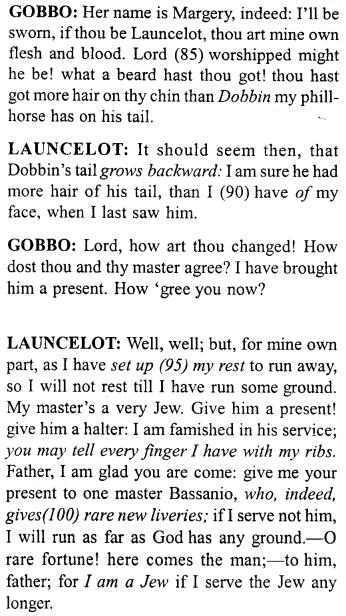
![]()
Modern English Reading
GOBBO : Her name is Margery, indeed: I’ll swear, if you are Launcelot, you are my own flesh and blood. Lord of us all,what a beard you’ve got! You have got more hair on your chin than Dobbin my thrill-horse has on his tail.
LAUNCELOT : It should seem, then, that Dobbin’s tail grows backward; I am sure he had more hair on his tail than I have on my face when I last saw him.
GOBBO : Lord! how you have changed! How do you and your master get along? I have brought him a present. How do you get along now?
LAUNCELOT : Well, well; but, as for me, as I have made up my mind to run away, so I’ll not rest until I have run some ground. My master’s a very Jew. Give him a present! Give him a halter. I am starving in his service; you can count my ribs with your fingers. Father, I’m glad you’ve come; give your present toone Master Bassanio, who indeed is giving rare new clothing to new servants. If I don’t serve him, I’ll run as far as God has any ground. Oh, rare fortune! Here comes the man: give the present to him, father; because I am a Jew, if I serve the Jew any longer.
Enter Bassanio with a follower or two [one of them Leonardo.]
Word Meaning With Annotation
Dobbin my fill-horse : ‘fill-horse’ denotes a horse used for drawing a cart, and “Dobbin” has always been an affectionate name bestowed on a horse in England, grows backward : becomes less instead of longer of : used instead of “on.” set up my rest : determined; resolved. This phrase is derived from a gambling game, and meant to stand upon the cards in one’s hand, relying that they would be better than those of an opponent, you may tell every finger I have with my ribs : the words “finger” and “ribs” should be interchanged. Launcelot means that he has not been sufficiently fed while in Shylock’s service, with the result that anyone is able to count all his ribs by feeling with a finger. But he makes this mistake, something a kin to what we call a “Spoonerism.” who, indeed, gives rare new liveries : In the meantime, Bassanio is engaged in fitting out his expedition to Belmont, and evidently Launcelot has heard that Bassanio’s servants are being clothed in fine new suits of uniform. I am a Jew : “May I become a Jew myself etc.” Launcelot means that this is- equally impossible as it is for him to remain longer in Shylock’s service.
Original Text
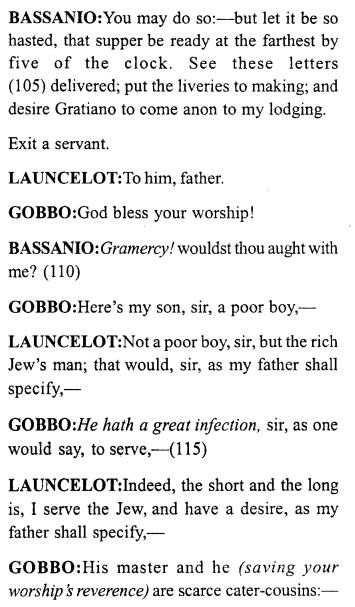
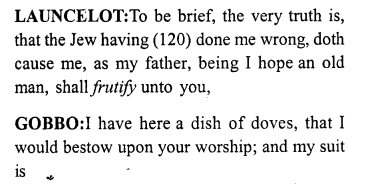
Modern English Reading
BASSANIO : You may do so; but let it be quickly so that supper is ready by five of the clock at the latest. See these letters are delivered, get the servants’ clothes made, and ask Gratiano to come now to my house.
Exit a servant.
LAUNCELOT : To him, father.
GOBBO : God bless you, sir!
BASSANIO : God have mercy, what do you want with me?
GOBBO : Here is my son, sir, a poor boy—
LAUNCELOT : Not a poor boy, sir, but the rich Jew’s man, that would, sir,—as my father shall specify.
GOBBO : He has a great infection, sir, as one would say, to serve—
LAUNCELOT : Indeed the short and the long is, I serve the Jew, and have a desire, as my father shall specify—
GOBBO : His master and he, God save you, sir, are almost like cousins—
LAUNCELOT : To be brief, the very truth is that the Jew, having done me wrong, causes me,— as my father, being I hope an old man, shall frutify to you—
GOBBO : I have here a dish of doves that I wish to give you, sir; and what I want is—
Word Meaning With Annotation
Grammercy : An exclamation denoting thanks; Bassanio acknowledges the respect paid in the words “Your worship”, he hath a great infection : He has a great desire. The word “infection” is deliberately used wrongly instead of “affection” saving your worship’s reverence : “with apologies to you Sit.” or “if I may mention the fact, Sir.” frutify : another word used wrongly by Launcelot; he means “explain” or “set forth”.
Original Text
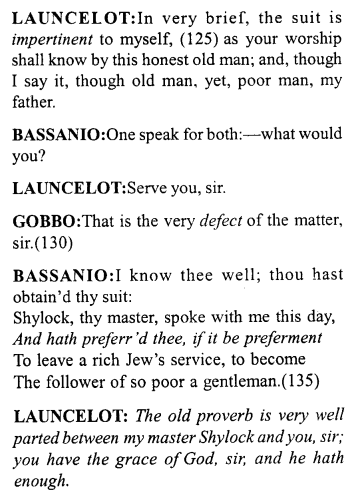
Modern English Reading
LAUNCELOT : In very brief, what he asks is impertinent to myself, asyou, sir, shall know from this honest old man; and, though I sayit, though old man, yet poor man, my father.
BASSANIO : One of you speak for both of you. What do you want?
LAUNCELOT : To serve you, sir.
GOBBO : That is the very defect of the matter, sir.
BASSANIO : I know you well; you have gotten what you ask for. Shylock your master spoke with me today, And has recommended you, if it is a recommendation To leave a rich Jew’s service to become The follower of so poor a gentleman.
LAUNCELOT : The old proverb is very well parted between my master Shylock and you, sir: you have the grace of God, sir, and he has enough.
Word Meaning With Annotation
Impertinent : ridiculous mistake. He means “pertinent” i.e. “my application pertains to or concerns myself.” defect : Gobbo means the “substance” or “effect” of the matter, and hath preferr’d thee, if it be preferment : the verb “prefer” meant either to recommend or to promote, the old proverb is very well parted between my master Shylock and you, sir; you have the grace of God, sir, and he hath enough : the proverb is “The grace of God is better than gear (possessions).” lodging : place of abode, guarded : “braided”. In the first place the edge of the cloth was bound with material to protect it and keep it form fraying. Then it came to mean additional cloth applied by way of ornament. Launcelot is to have a uniform with more ornamental stripes on it than the other servants.
Original Text
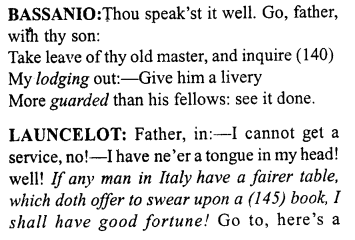
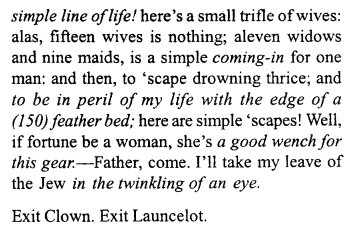
Modern English Reading
BASSANIO : You speak well. Go, father, with your son. Say goodbye to your old master, and find out where I live. Give him clothes that are less showy than that of his fellows; see it gets done.
LAUNCELOT : Father, go in. I cannot get a service, no! I have never had a tongue in my head! Well; if any man in Italy has a better table that offers to swear on a book, I shall have good luck. Come on; here’s a simple line of life; here’s a small number of wives; sadly, fifteen wives is nothing; eleven widows and nine maids is a simple coming-in for one man. And then to escape drowning three times, and to be in fear for my life with the edge of a feather bed; here are simple escapes. Well, if Fortune is a woman, she’s a good woman for this guy. Father, come; I’ll take my leave of the Jew in the twinkling of an eye.
Exit Clown. Exit Launcelot.
Word Meaning With Annotation
If any man in Italy have a fairer table, which doth offer to swear upon a book, I shall have good fortune! : The general sense is- “Any one who has (or who can swear he has) a hand better endowed than mine, is lucky indeed.” “Table” is a technical term in palmistry, meaning the palm of the hand on which the lines are read. It is enough to remember that Shakespeare depicts Launcelot as overjoyed by his good luck, and makes him speak in a confused and excited manner, simple line of life : a clearly marked line on his palm, denoting that he will have long life, coming-in : that which comes in, i.e. something acquired, to be in peril of my life with the edge of a feather bed : The sense is “and I see also from my hand that I shall at one time be in danger of losing my life, and also I see the symbol of a bed, denoting a wealthy marriage for me.” a good wench for gear : a kind lady for showing me this prospect of possessions. in the twinkling of an eye : “in an instant’, or, as the saying goes, As
quickly as you could wink.”
Original Text
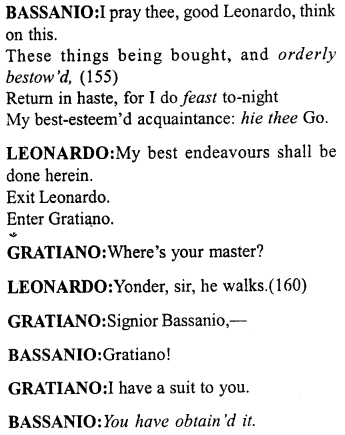
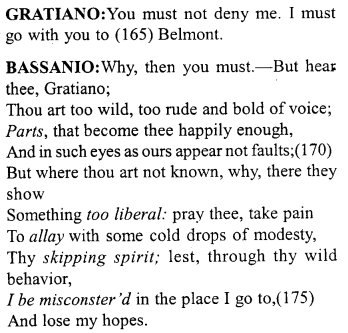
Modern English Reading
BASSANIO : Please, good Leonardo, think about this: Once these things have been bought and orderly put away Come back quickly, because I feast tonight with My best-esteemed acquaintance; hurry up, go.
LEONARDO : You have my best efforts to get everything done as you ask. Exit Leonardo. Enter Gratiano.
GRATIANO : Where’s your master? LEONARDO:Over there, sir, he’s walking. GRATIANO: Mr. Bassanio!— BASSANIO:Gratiano!
GRATIANO : I have to ask you something.
BASSANIO : You’ve got it.
GRATIANO : You mustn’t say no: I must go with you to Belmont.
BASSANIO : Why, then you must go. But listen, Gratiano;You are too wild, too rude, and loud, Qualities that become you happily enough,And, in such eyes as ours, don’t appear to be faults; But where no one knows you, why there, these qualities Show something that’s too liberal. Please, take pains To behave yourself and to control Your wild spirit, so that I won’t be misunderstood As to why I came, because of your wild behavior, And lose my hopes of marriage.
Word Meaning With Annotation
Orderly bestowed : carefully placed on board the ship, feast: entertain, hie thee : “Betake yourself’ or “Go.” you have obtained it : Bassanio grants the request before he knows what it is. parts : characteristics; manners, too liberal : overdone; too bold, allay : to weaken; to abate, skipping spirit : unruly disposition. I be misconstrued : I should find my errand misunderstood.
Original Text
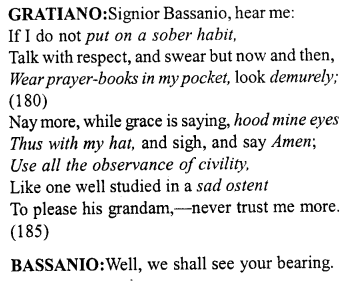
Modern English Reading
GRATIANO : Mr. Bassanio, listen to me: If I don’t put on a sober habit, talk with respect, and swear only now and then, wear prayer- books in my pocket, look demurely, No more, while grace is saying, hood my eyes like this with my hat, and sigh, and say “amen;” Use all the observances of manners, as one well studied in a sad display in order to please his grandmother, never trust me anymore.
BASSANIO : Well, we’ll see your behavior.
Word Meaning With Annotation
Put on a sober habit : assume quieter manners, wear prayer books in my pocket : to give people the impression that he was a devout man, given to religious exercises, demurely : modestly ; equietly. hood mine eyes, thus with my hat : men of quality wore hats at meals; probably the custom was that when the grace (prayer of thanks) was being said, they held the hat reverently in front of the face. Amen : the word which concludes a prayer. Use all the observance of civility : company with the usages of good society, sad ostent : appearance of solemnity.
Original Text
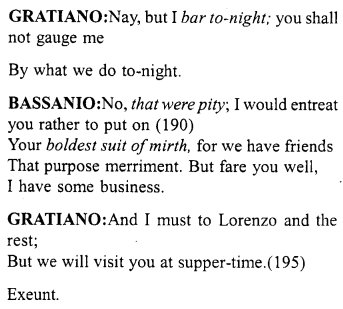
Modern English Reading
GRATIANO : No, but tonight is an exception; you shall not judge me by what we do tonight.
BASSANIO : No, that would be a pity;I would beg you rather to put on your boldest face of happiness, because we have friends that offer merriment. But goodbye; I have some business to see to.
GRATIANO : And I must go to Lorenzo and the rest; But we’ll visit you at suppertime.
Exeunt.
Word Meaning With Annotation
Bar to-night : make an exception of tonight gauge, judge, that were pity : it would be a pity to do so. boldest suit of mirth : “Your gayest dress”, or “Your most mirthful mood.” the latter is more suitable to the context.
For More Resources
